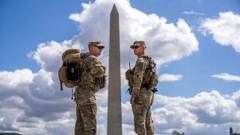Is Washington DC Taking Legal Action Against Trump's National Guard Deployment?

Published: 2025-09-04 16:21:01 | Category: wales
Washington D.C. has taken legal action against the Trump administration, challenging the constitutionality of the National Guard's deployment in the capital. The lawsuit, filed by Attorney General Brian Schwalb, claims that President Trump violated both the U.S. Constitution and federal law by sending troops without local consent, which undermines the city's autonomy and negatively impacts its economy.
Last updated: 11 October 2023 (BST)
Key Takeaways
- Washington D.C. filed a lawsuit against the Trump administration regarding the National Guard's deployment.
- Attorney General Brian Schwalb argues the deployment violates local autonomy.
- President Trump began troop deployments on 11 August as part of a crime crackdown.
- The lawsuit aims to halt what is described as illegal federal overreach.
- Federal law enforcement is also active in the city, with claims of checkpoints and arrests.
Background of the Lawsuit
The legal action comes amid heightened tensions in Washington D.C., as the Trump administration has intensified its presence in the city through military and federal law enforcement. Schwalb's lawsuit contends that the President's unilateral decision to deploy troops without local leaders' approval not only violates the local governance established by the District of Columbia Home Rule Act but also sets a troubling precedent for federal overreach into local affairs.
Understanding Home Rule in Washington D.C.
Home Rule refers to the ability of a local government to govern itself with minimal interference from the federal government. In D.C., this means that while Congress retains ultimate authority, the city has a certain degree of autonomy over its local laws and operations. The lawsuit highlights the importance of this autonomy, arguing that the Trump administration's actions undermine the city's self-governance.
The Deployment of the National Guard
On 11 August, President Trump ordered the National Guard to deploy in an effort to address crime and homelessness in Washington D.C. This move has been met with significant criticism from local leaders, who argue that such a military presence is not only unwarranted but also exacerbates tensions within the community.
Schwalb asserted, "Deploying the National Guard to engage in law enforcement is not only unnecessary and unwanted, but it is also dangerous and harmful to the District and its residents," emphasising the potential risks associated with militarising local policing efforts.
The Broader Context of Federal Law Enforcement
In addition to the National Guard, federal law enforcement agents, including those from the Immigration and Customs Enforcement (ICE), have been patrolling the streets of Washington D.C. Reports suggest that they are actively checking for undocumented immigrants, leading to concerns about civil liberties and the rights of residents. Critics argue that this creates an atmosphere of fear and distrust, particularly among immigrant communities.
Implications for Other Cities
Schwalb's statement that "it's DC today but could be any other city tomorrow" raises alarm bells regarding the potential for similar actions in other major urban centres. The President has hinted at deploying troops to other Democratic strongholds like Chicago and New Orleans, suggesting a strategy that could further escalate tensions between Democratic-led cities and the federal government.
Legal Considerations and Next Steps
The lawsuit is expected to unfold in the coming weeks, with various legal challenges anticipated. Legal experts suggest that the outcome may hinge on interpretations of the Home Rule Act and the extent of federal powers in local governance. As the case progresses, it may also spark discussions about the balance of power between federal and local authorities.
Public Reaction and Future Prospects
The public response to the deployment has been mixed. Some residents support the presence of troops as a necessary measure to combat crime, while others see it as an infringement on their rights and a violation of the democratic principles that underpin local governance. The lawsuit aims to channel this discontent into a legal framework that protects local autonomy.
What Happens Next?
As the legal proceedings begin, both sides will prepare their arguments, with the potential for a lengthy court battle. The outcome could set significant precedents regarding the interaction between federal authorities and local governance, especially in the context of emergency powers and law enforcement practices.
FAQs
What is the basis of Washington D.C.'s lawsuit against the Trump administration?
The lawsuit is based on claims that President Trump violated the U.S. Constitution and federal law by deploying the National Guard without local consent, undermining the city's autonomy.
When did the National Guard troops begin their deployment in D.C.?
The National Guard troops began their deployment on 11 August 2023 as part of a crackdown on crime and homelessness in the city.
What are the potential implications of this lawsuit for other cities?
The lawsuit could set a precedent for how federal authorities interact with local governance, potentially impacting other cities facing similar situations.
What is Home Rule in the context of Washington D.C.?
Home Rule allows D.C. to govern itself with a degree of autonomy, although Congress retains ultimate authority over local laws and operations.
How has the public reacted to the deployment of the National Guard?
The public response has been divided, with some supporting the troops as a crime-fighting measure while others view it as an infringement on civil rights and local governance.



